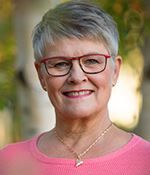Please Note: Due to Covid-19, presentations will be delivered via Zoom Webinar through December 2020. WACHH members participate at no charge. Non-members must register via the website and pay $10 to participate.

Abstract
 Take one look at international reports that measure different indices such as competition, productivity, economic growth, equal opportunities, innovation, quality of life, happiness, etc., and you often find the Nordic countries, Sweden, Norway, Denmark, and Finland at the top of these lists. It seems like these countries have done something right and also have something in common that has taken them to where they are today. How have these small countries, close to the arctic circle, that suffered poverty and population flight in the 1800’s, now topped so many surveys? It’s the so-called Nordic Model.
Take one look at international reports that measure different indices such as competition, productivity, economic growth, equal opportunities, innovation, quality of life, happiness, etc., and you often find the Nordic countries, Sweden, Norway, Denmark, and Finland at the top of these lists. It seems like these countries have done something right and also have something in common that has taken them to where they are today. How have these small countries, close to the arctic circle, that suffered poverty and population flight in the 1800’s, now topped so many surveys? It’s the so-called Nordic Model.
These countries have developed thriving economies with common social values. Open markets and strong competition created many global businesses in diverse sectors and developed wealth for both individuals and society. Politically, the tradition has been to find consensus in the decision making process. Compromise has been a key factor when difficult decisions have been made from pension reform to tax systems to labor markets. These rules and agreements have helped both workers and companies grow and also created a stable market.
Words like cooperation, consensus, and compromise are key words in our Nordic tradition. But also openness, social justice, equal rights and opportunities are core values for the whole society. These countries combine social safety and strong individualism at the same time. The private sector, the public sector, and NGOs have worked together on these values.
This is interesting to look at in a political context where conflict and differences are the new mantra. Globally, it seems like it’s better to find ways to disagree rather to find common ground. It seems better to talk about what divides us rather than what’s bringing us together; it’s very much about right or wrong. Of course these tendencies also reach the Nordic countries. The last financial crisis, globalization, digitalization and also a big migration to Europe are challenging for the region. A lot of people feel that things are getting worse when facts show the opposite.
So the question is: will it be possible for the Nordic countries to use their historically strong position of values and development to meet all these challenges? There’s a debate about if these common values of equal rights, free trade and a market economy are right for the future. So, is it possible to meet these challenges with new answers and who are the main actors?
Biography
Maud Olofsson is the former Deputy Prime Minister of Sweden (2006-2010) and Minister for Enterprise and Energy of Sweden. She is also a former party leader for the Swedish Centre Party.
Maud Olofsson has always been active in Nordic, European and global issues. During her time as Minister she worked with the Nordic Council to create a common energy market for the Nordic region. As Minister for Enterprise and Regional Development she worked to open the Nordic market and help Nordic companies enter the European marketplace.
Maud Olofsson worked on the European level to coordinate the Nordic position in three EU councils: Energy, Competition and Regional Affairs. In 2009 Sweden was the chair of the European Union; Maud Olofsson led all negotiations in these three councils. During her tenure the EU developed an energy and climate package to reduce emissions and advance a sustainable energy market.
Olofsson was a leader of the Centre Party for 11 years and a champion for pro-European and Nordic cooperation. She has been active in politics since she was 14 years old. She has held positions on local, regional, national and European levels.
After stepping down as Party leader in 2011 Maud Olofsson became a member of the U.S. Department of State’s International Council on Women’s Business Leadership (ICWBL) under the chairmanship of Secretary Hillary Clinton. While serving in the ICWBL, Maud Olofsson built an international women’s leadership program, “Women Leaders Up” with the McKinsey group in Sweden. She currently leads her own consulting firm, is president of the Swedish tourist organization Visita, and serves on the board for the confederation of Swedish Enterprise as well as several global companies.